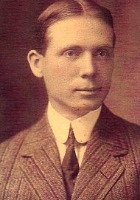Henry Herbert Knibbs Biography
Henry Herbert Knibbs was born to American parents on October 24, 1874, in Clifton, Ontario (later known as Niagara Falls). He became fascinated by the fiddle and learned to play at an early age. He suffered from a respiratory ailment for most of his life. Knibbs never worked as a cowboy, but he wrote western short stories, novels and poems. His father, George Knibbs, was a bank clerk at Pierce, Howard and Co., Bankers in Niagara Falls, Ontario. Eventually the company failed, casting the family into hard times. Knibbs spent summer vacations at his grandparents' farm in Pennsylvania. On the farm, he developed a love of horses nearly as great as that for his fiddle. Though he never earned a college degree, Knibbs attended Woodstock College and Bishop Ridley College in Ontario and studied English at Harvard. Leaving college, he spent two years hoboing in the American Midwest. In 1899, he married Ida Julia Pfeifer and went to work for the railroad in Buffalo, N.Y. In 1910, he moved to California and wrote his first Western novel, Lost Farm Camp. He then left on a long trip through New Mexico, Arizona and California to soak up local color for his writing. In 1929, Knibbs left his wife to live with Turbesé Lummis Fiske. Ida refused to grant him a divorce and wrote him daily begging him to return home. Turbesé, whose father, Charles Lummis, was a Western writer, influenced and edited much of his later work. Knibbs wrote 13 novels and six books of poems. His novels are out of print and largely forgotten, but his poetry remains popular in cowboy poet circles. Among his best remembered poems are Boomer Johnson and When the Ponies Come to Drink. Seven films made between 1919 and 1930 were based on his stories and novels. Knibbs career as a Western write came to a sudden halt when he mistakenly gave the period of a mare's gestation as nine months in a story published in the Saturday Evening Post. He was crucified by his peers for the mistake. He certainly knew that the correct period was 11 months, but this slip of the pen cost him his writing career, as he was never able to get another piece published. He died in San Diego, California, on May 17, 1945, from respiratory illness.
Never twice in the world you find,
A lad whose heart is the gold you spend,
And his free hand of your heart, in kind,
...
I don't mind working to earn my bread,
And I'd just as soon keep straight;
I've listened to what the preacher said
About rams and sheep at the gate;
...
'Save your hoss for the hills ahead,' is the cowboy's placid song.
While his clear eyes follow the twinkling train as the Titan speeds along;
...
Now Mr. Boomer Johnson was a gettin' old in spots,
But you don't expect a bad man to go wrastlin' pans and pots;
...
Chinook, you're free: there's plenty pasture there:
Your gallant years have earned you more ... and
yet ..
...
